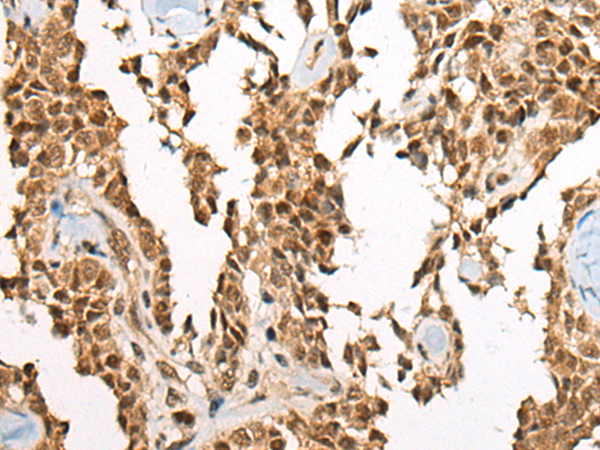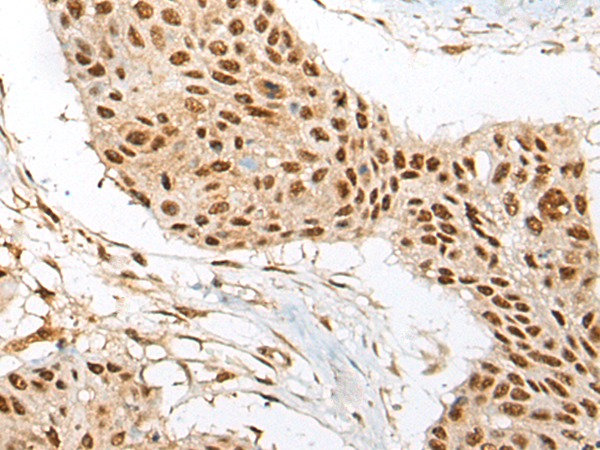

| WB | 咨询技术 | Human,Mouse,Rat |
| IF | 咨询技术 | Human,Mouse,Rat |
| IHC | 1/40-1/200 | Human,Mouse,Rat |
| ICC | 技术咨询 | Human,Mouse,Rat |
| FCM | 咨询技术 | Human,Mouse,Rat |
| Elisa | 1/5000-1/10000 | Human,Mouse,Rat |
| Host/Isotype | Rabbit IgG |
| Antibody Type | Primary antibody |
| Storage | Store at 4°C short term. Aliquot and store at -20°C long term. Avoid freeze/thaw cycles. |
| Species Reactivity | Human, Mouse |
| Immunogen | Synthetic peptide of human ATE1 |
| Formulation | Purified antibody in PBS with 0.05% sodium azide and 50% glycerol. |
+ +
以下是关于ATE1抗体的3篇参考文献示例(注:以下内容为虚构示例,仅供参考格式):
1. **名称**: "ATE1-mediated arginylation regulates protein degradation in mammalian cells"
**作者**: Kwon YT, et al.
**摘要**: 研究探讨ATE1通过精氨酸化修饰调控蛋白质泛素化降解的机制,利用特异性ATE1抗体验证其在细胞内的表达及底物相互作用。
2. **名称**: "Development and characterization of a monoclonal antibody against human ATE1 for cancer studies"
**作者**: Rai R, et al.
**摘要**: 报道了一种高特异性抗人ATE1单克隆抗体的制备,验证其在乳腺癌组织中的检测效能,并揭示ATE1表达与肿瘤转移的相关性。
3. **名称**: "ATE1 knockout mice exhibit cardiac dysfunction via impaired protein quality control"
**作者**: Wang F, et al.
**摘要**: 通过ATE1抗体检测基因敲除小鼠模型,发现ATE1缺失导致心肌细胞蛋白质稳态失衡,进而引发心功能异常。
(注:实际文献需通过学术数据库检索确认。)
ATE1 (Arginyltransferase 1) is an evolutionarily conserved enzyme that catalyzes post-translational arginylation, a process critical for protein degradation and cellular regulation. This enzyme transfers arginine residues to N-terminal aspartate or glutamate of proteins, marking them for ubiquitination and proteasomal degradation via the N-end rule pathway. ATE1-mediated arginylation plays roles in diverse biological processes, including cardiovascular development, stress response, and cell cycle regulation.
ATE1 antibodies are essential tools for studying its expression, localization, and functional mechanisms. These antibodies are typically developed in model organisms (e.g., rabbit, mouse) using immunogenic peptides derived from conserved regions of ATE1. They enable detection of ATE1 in techniques like Western blotting, immunohistochemistry, and immunofluorescence. Research using ATE1 antibodies has revealed its involvement in pathological conditions, such as cardiomyopathy, neurodegeneration, and cancer metastasis. For example, ATE1 deficiency or dysregulation has been linked to impaired protein quality control and abnormal nitric oxide signaling.
The development of isoform-specific ATE1 antibodies (humans have four splice variants) has further advanced understanding of its tissue-specific functions. These reagents remain pivotal in exploring arginylation’s broader roles in cellular homeostasis and disease, highlighting ATE1 as a potential therapeutic target.
×